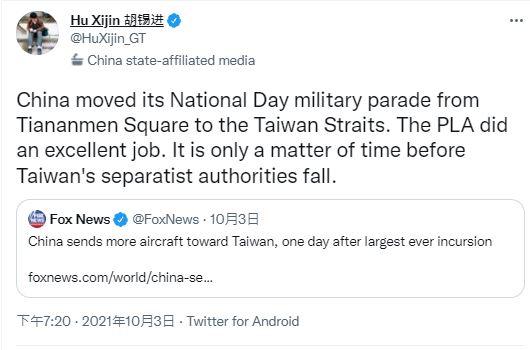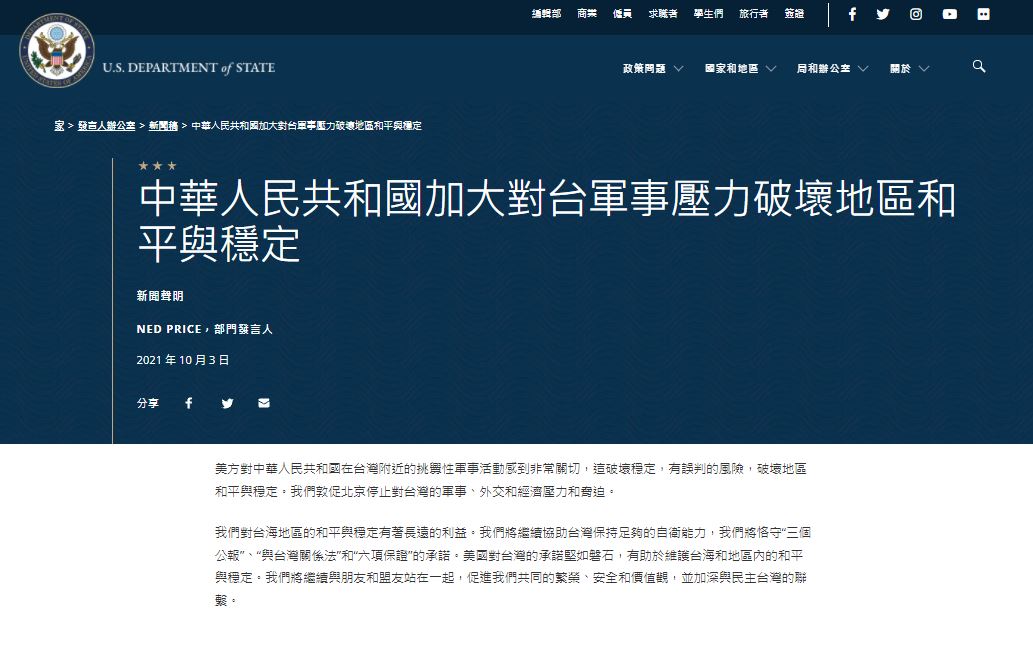From October 1 to 3, China dispatched 93 military aircraft into the airspace of the Taiwan Strait. On the 4th, it set a record of 52 in a single day. The alarming number has angered the United States, and the State Department issued a special statement condemning China's "provocative actions" for destabilizing. Just more than ten hours after the U.S. expressed its position, the Japan Maritime Self-Defense Force issued a press release at noon on the 4th , confirming that joint exercises will be held in the waters southwest of Okinawa with the navies of the United States, Britain, the Netherlands, Canada, and New Zealand from October 2 to 3. The purpose of the exercise is to strengthen cooperation and "realize a free and open Indo-Pacific region." International public opinion has also interpreted it as an intention to declare combat power and express a position to China.
The senior officials of the National Security Council have not yet responded to the joint plane's provocation of the President's double tenth speech, which is expected to sternly respond
Compared with the actions of the countries concerned, the Chinese government has not yet responded to China's provocations. In addition to the Ministry of Foreign Affairs expressing its gratitude to the US State Department for its statement, it is understood that the senior officials of the National Security Council are assessing how to make a serious response to the Chinese threat. Since President Tsai Ing-wen will deliver a double ten speech on October 10, it is expected that the talk will also make a more complete and clear stance on China’s threat of force.
The People's Liberation Army dispatched 93 military aircraft into the airspace across the Taiwan Strait from October 1st to 3rd. Among them, the first and second consecutive days broke the record for the largest number of military aircraft in a single day. In the face of international media describing China’s actions as "invasion" and "provocation," Hu Xijin, the editor-in-chief of China's Global Times, tweeted that China moved the 11th parade from Tiananmen Square to the Taiwan Strait. "The downfall of the Taiwan regime is only A matter of time".

China's military actions did not cause public panic in Taiwan, but it inspired the United States to publicly declare to protect Taiwan . The State Council issued a statement especially on weekends and holidays, condemning China's provocative actions for destabilizing regional stability, demanding that the Beijing government stop exerting pressure on Taiwan and reiterating its firm support for Taiwan.

The U.S. administrative department releases photos of the six-nation warship formation after it publicly stands up
And half a day after the U.S. administration publicly stated that the Taiwan was erected, the Japanese Maritime Defense Force released a set of photos on the official Twitter at noon on the 4th , confirming that the three Japanese frigates and the U.S., British, Canadian, Dutch and New Zealand navies, Conducted joint maritime exercises from October 2 to 3; tweeted and marked "Free and Open Indo-Pacific" (#FOIP).
Subsequently, the Japanese Maritime Defense Force issued an official press release on its official website, explaining the warships of various countries participating in this joint maritime exercise. The press release pointed out that the joint training site was in the waters southwest of Okinawa. Japan sent three frigates, Ise, Kirishima, and Sangiri, and the U.S. Navy sent aircraft carriers USS Ronald Reagan and USS Carl. Vinson, the cruisers USS Shiloh and USS Lake Champlain, and the destroyers USS The Sullivans and USS Chaffee.

The Royal Navy sent the aircraft carrier HMS Queen Elizabeth, as well as the destroyer HMS Defender, the frigate HMS Kent, and the supply ships Fort Victoria and Swell. (Tidespring). The Canadian frigate Winnipeg (HMCS Winnipeg), the Dutch frigate HNLMS Evertsen, and the New Zealand frigate Te Kaha (HMNZS Te Kaha) each represented the country.
The six nations unite in maritime training to show their power to China and their allies to defend the "free and open Indo-Pacific"
The Japanese side pointed out in the press release that the training items include anti-submarine warfare, air defense warfare, anti-submarine warfare, tactical maneuvering, and communication training. According to related reports, the three aircraft carrier strike groups and a total of 17 ships jointly participating in the warships, the carrier-based fighters of the Carl Vinson, Reagan, and Queen Elizabeth, also flew in formation during the exercise as planned.
This six-nation maritime joint exercise was interpreted as a demonstration of combat power to China and a declaration of the common principle of defending the "free and open Indo-Pacific." This is also after Japan held the "Pacific Crown" (Pacific Crown) joint maritime exercise with the United States, the United Kingdom, the Netherlands and Canada a month ago, and once again coordinated with its security allies to defend the "free and open Indo-Pacific."
The joint exercise in the southwestern waters of Okinawa ended the day after the end, including the Chinese think tank "SCS Probing Initiative", as well as many military observation units from Taiwan and abroad disclosed that the British aircraft carrier Queen Elizabeth was passing buses. The movement of the strait to the South China Sea, and the traces of the V-22 Osprey-type tilt-rotor carrier aircraft of the US aircraft carrier USS Carl Vinson were found nearby. It is speculated that the two ships may converge.
Australian media interview with Wu Zhaoxie: Chinese armed force invades Taiwan, Taiwan will fight to the end
As China continues to move in the Taiwan Strait and the Indo-Pacific region, the United States, Britain and other countries have also stepped up their deployment in this area. Facing the rising situation around the Taiwan Strait, Taiwan’s Foreign Minister Wu Zhaoxie emphasized in an exclusive interview with the Australian media on the 3rd that if China violates Taiwan by force, Taiwan will fight to the end, and China will "pay a huge price." In fact, the US ambassador to Australia confirmed a month ago that Australia and the US are discussing emergency contingency plans to prevent a military conflict between Taiwan and China. Wu Zhaoxie also stated in the interview that Taiwan hopes to cooperate with countries with similar ideas, including Australia, for security or intelligence exchanges.



